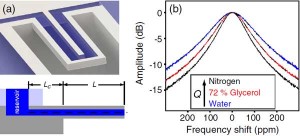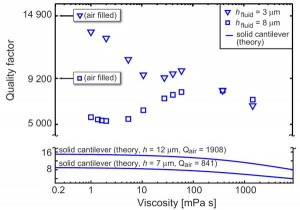Nonmonotonic Energy Dissipation in Microfluidic Resonators
Micro- and nanomechanical cantilevers are widely used as sensitive probes for physical measurements in materials science, engineering, and biology. In vacuums and air, detecting shifts in the resonance frequency enables exquisitely sensitive measurements of mass and detection of single DNA molecules, single viral particles, and single bacterial cells. However, numerous applications in nanotechnology and the life sciences require samples to be contained in liquid. Recently, measurements have demonstrated that viscous damping is substantially reduced by confining the (liquid) sample to a microfluidic channel embedded inside a cantilever beam surrounded by vacuum (Figure 1). Such devices enable mass measurements of nanoparticles, single bacterial cells, and submonolayers of adsorbed proteins with femtogram sensitivity in liquid. A key outstanding question is how energy dissipation, and hence sensitivity, scales with the size of the resonator and the density and viscosity of the fluid. This is of particular interest since two of the most intriguing size regimes for these devices remain to be explored: (i) where the resonators are small enough to acquire mass spectra of viruses, protein complexes, and ultimately single molecules directly in solution and (ii) where the channel is large enough to measure the growth of mammalian cells by monitoring their mass with high precision. We have addressed this question through theory and through measurements; our results reveal surprising connections between the fluid properties, energy dissipation, and the device dimensions in liquid-filled microcantilevers. While the quality factor of conventional cantilever sensors submersed in fluid always degrades with increasing viscosity, we show that damping in liquid-filled cantilevers can increase or decrease as viscosity increases (Figure 2).
- Figure 1: (a) Cut-away view (top) and schematic (bottom) of fluid-filled cantilever resonator surrounded by vacuum; fluid channel (blue) is completely filled. (b) Frequency response showing fits to a damped harmonic oscillator response.
- Figure 2: Quality factor of vacuum encapsulated cantilevers with 3- and 8-micron channels as a function of fluid viscosity. Viscosity was varied by injecting different solutions of glycerol in water. Solid lines show the predicted quality factor for solid cantilevers that have the same outer dimensions as the embedded-channel cantilevers used here.
References
- T. P. Burg, J.E. Sader and S. R. Manalis, “Nonmonotonic Energy Dissipation in Microfluidic Resonators,” Phys. Rev. Lett., 2009, 102, 228103.

